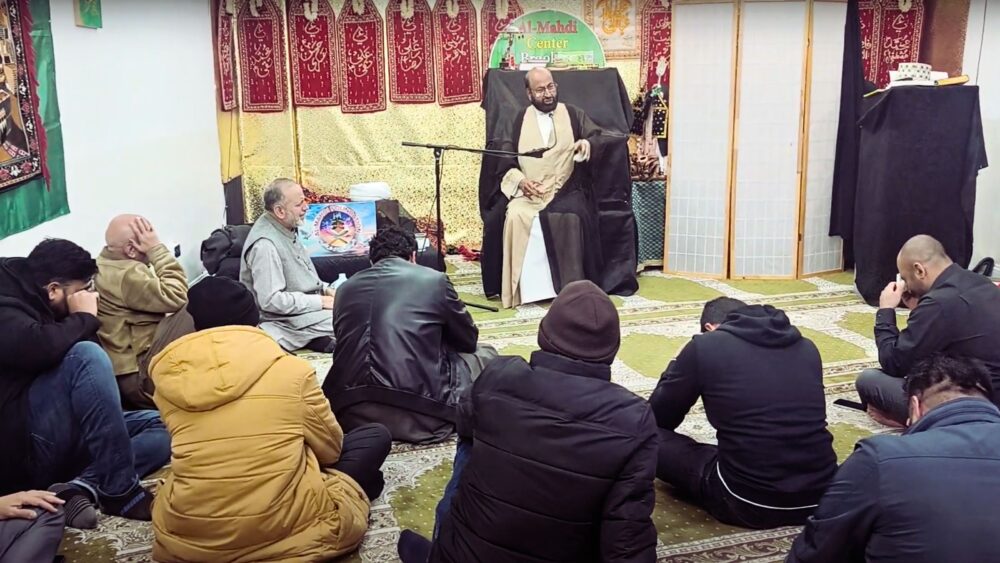
NEW YORK – A couple dozen grown men are seated on the floor, sobbing in unison.
It’s a rainy Sunday evening on Coney Island Avenue, in a Brooklyn neighborhood better known as Little Pakistan. A small crowd has gathered in the prayer hall of the Al-Mahdi Foundation’s masjid, a Shi’a mosque.
There are songs being sung, and poems recited. Each verse pays homage to Zainab bint Ali, the granddaughter of Prophet Muhammad.
The previous day, the 27th of January 2024, was also the 15th of Rajab 1445, as per the Hijri or Islamic calendar. It was the day that Zainab is said to have passed away, close to 14 centuries ago. The Shia congregation in Brooklyn is mourning Zainab by retelling stories of her suffering and bravery.
“Adab se kahiye, salaam Zainab (say it with respect, salutations to Zainab),” sings Rashid Zaidi, a worshiper at the mosque.
Prior to her death, Zainab had been taken captive by the forces of Yazid, the second chief of the Umayyad Caliphate. This was after the Battle of Karbala, in which Zainab’s brother Hussain and several of her relatives are said to have been killed by the forces of Yazid.
Zainab is remembered by the gathering for her resolve and resistance in the face of oppression. “Quran agar Hussain, tafsir hai Zainab (If Hussain is the Quran, then Zainab is its interpretation)”, recites a worshiper.
Shi’a Muslims, who comprise a minority within Islam, are also a minority among the Muslim population in New York City. The majority of mosques in the city belong to the Sunnis. The holy day commemorating Zainab’s death, however, holds significance for Shi’a and not Sunni practitioners, and the Al-Mahdi masjid in Brooklyn is one of the few places in the city where such a commemorative event is being held.
As Zainab’s hardships in captivity are recounted, many of the members in the congregation cannot bear to look. They cup their faces in their hands in grief. An elderly man crinkles his tearful eyes and slaps his thighs. Next to him, 65-year-old Hasan Raza beats his chest lightly. He laments, “People slayed the Prophet’s family just for the lust of power. When we remember that, we cry.”
Syed Basit Naqvi, a 43-year-old cab driver, explains his outpouring of emotions during the commemoration, “Zainab’s captors had tried to humiliate her by walking her through the streets and snatching her hijab away from her. If I close my eyes, I feel like I’m looking at those things happening in front of me.” He adds, “You can feel it happening and you feel helpless.”
Channeling The Grief
“You relate to their grief, and the grief gives us a sense of belonging,” says Hussain Raza, a 36-year-old software developer from Pennsylvania, who attended the event in Brooklyn on Sunday. He adds, “Isn’t that what everyone is looking for in the world – a sense of belonging?”
Raza continues, “When you listen, it goes in from one ear and then, I’m a software person so I’d say it goes into a loop, and then it goes to a different function in the body, your heart, your brain, and the emotion hits…and you tear up. It happens in milliseconds.”
Naqvi says, “The grief helps me – when you associate yourself with victims like them (Zainab and those alongside her), you tend to be more sympathetic with other people. The main purpose is so that you don’t become the oppressors.”
He says it makes him want to help other people. “The grief softens your heart when somebody is in pain. Because when you’re grieving people who have been killed like this, you cannot be cruel to anybody else.”
A young boy comes to remind Naqvi that they have to get going. It’s his nephew.
As Naqvi proceeds to leave the mosque, he remarks, “I don’t feel angry on hearing the story. I feel that this thing happened in the past, but it shouldn’t happen again. Never again.”
